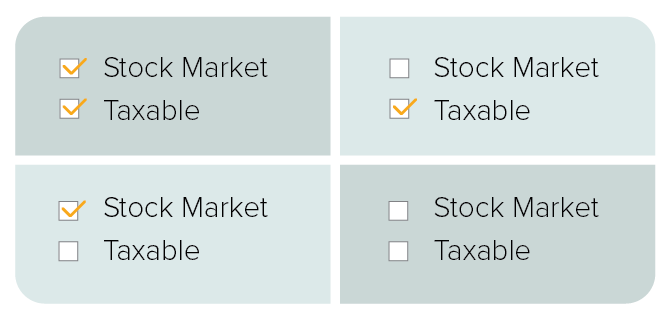If you are approaching retirement, do you worry about making costly mistakes that damage your nest egg? “What if I find out I paid way too much in taxes? Or what if I lose it all in the next market crash?” If so, you’re in good company. This is one of the top concerns we hear from new clients. You’ve invested in 401(k)s, IRAs, and savings accounts, but now it’s time to start taking a regular paycheck from your hard-earned portfolio and it’s getting real.
It quickly becomes complicated and overwhelming because there’s much to consider. We’ve discussed some aspects of planning for retirement in How Much You Need to Retire and Creating Your Retirement Paycheck, but let’s discuss an exercise to address the risks of taxes and market volatility. No matter how many separate accounts you have, we find that nearly all retirement income sources fit into one of these four quadrants:
Four Quadrants of Retirement Income

While there is no bulletproof risk-free plan, we find that it helps to have assets in each quadrant. You don’t want all your investments in one stock and, similarly, you could be at unnecessary risk by having everything in one quadrant. Let’s start by defining and listing assets that that fit each quadrant.
Taxable and tied to stock market
Your traditional 401(k), IRA, and many other company retirement plans fit into this quadrant. These accounts can have great up-side potential but become a liability in a down stock market or when tax rates are higher.
This quadrant gives you a tax deduction today, but you’ll pay income tax when you take money out in retirement, just like you did on your regular paycheck. The hope is that you’ll pay tax at a lower rate when you’re retired, but this is not guaranteed.
This quadrant is also invested primarily in stocks and bonds, when the market is up, you’re up, but when the market drops, so does your account balance. While you can reduce this risk through diversification, you can’t ever fully eliminate it.
Non-taxable and tied to stock market
The most common examples in this quadrant are Roth IRA and Roth 401(k)s, though some consider the cash value of Variable Universal Life insurance in this group, as well, because funds are invested in mutual fund-like accounts.
This quadrant won’t help with taxes today, but you get everything out tax-free in retirement…including all the growth you’ve earned over the years. You might have paid a bit more in tax during your working years, but you get to spend every penny from these accounts in retirement with nothing lost to the IRS.
This quadrant is still invested primarily in stocks and bonds, so you still need to manage risks through investment strategy based your risk tolerance and how long until you plan to spend the money.
Taxable and not tied to stock market
Income sources like social security, pensions, guaranteed annuities, and rent fall into this category. You’ll pay income tax on some or all of the income, but your income isn’t likely to be affected by the day-to-day swings in the stock market. Phew!
Non-taxable and not tied to stock market
Municipal bonds, cash (though you’ll pay tax on interest income) and, when structured properly, the cash value in many types of permanent life insurance fall into this quadrant. Municipal bonds are generally free from federal tax and state tax in the state the bond was issued. They didn’t help lower the tax bill during working years and may not have had the same surging returns when the market rallies, but this quadrant can be a welcome source of tax-free stability in retirement.
With our quadrants defined, let’s look at how diversifying your income sources can add to your bottom line in retirement.
How this affects your taxes in retirement
Let’s say you’re married, plan to spend $150,000 per year in retirement, and will take the standard income tax deduction each year. We’ll assume tax rates stay at 2023 rates. Each year, you’ll pay:
- 10% tax on taxable income up to $22,000
- 12% from $22,000 to $89,450
- 22% on income up to $190,750
If it all comes from a traditional 401k, your income is 100% taxable, and you’ll pay $17,521 in tax each year. But if 50% comes from a traditional 401k and 50% from a tax-free Roth IRA, you’ll pay just $5,236 each year, less than one third of the tax bill! What could this mean over 20 years?
| 100% Taxable Income | 50% Taxable, 50% Tax-free Income | ||||||
|---|---|---|---|---|---|---|---|
| Income | Tax | Income | Tax | ||||
| $ 150,000 | $ 17,521 | $ 150,000 | $ 5,236 | ||||
| $ 150,000 | $ 17,521 | $ 150,000 | $ 5,236 | ||||
| $ 150,000 | $ 17,521 | $ 150,000 | $ 5,236 | ||||
| $ 150,000 | $ 17,521 | $ 150,000 | $ 5,236 | ||||
| $ 150,000 | $ 17,521 | $ 150,000 | $ 5,236 | ||||
| $ 150,000 | $ 17,521 | $ 150,000 | $ 5,236 | ||||
| $ 150,000 | $ 17,521 | $ 150,000 | $ 5,236 | ||||
| $ 150,000 | $ 17,521 | $ 150,000 | $ 5,236 | ||||
| $ 150,000 | $ 17,521 | $ 150,000 | $ 5,236 | ||||
| $ 150,000 | $ 17,521 | $ 150,000 | $ 5,236 | ||||
| $ 150,000 | $ 17,521 | $ 150,000 | $ 5,236 | ||||
| $ 150,000 | $ 17,521 | $ 150,000 | $ 5,236 | ||||
| $ 150,000 | $ 17,521 | $ 150,000 | $ 5,236 | ||||
| $ 150,000 | $ 17,521 | $ 150,000 | $ 5,236 | ||||
| $ 150,000 | $ 17,521 | $ 150,000 | $ 5,236 | ||||
| $ 150,000 | $ 17,521 | $ 150,000 | $ 5,236 | ||||
| $ 150,000 | $ 17,521 | $ 150,000 | $ 5,236 | ||||
| $ 150,000 | $ 17,521 | $ 150,000 | $ 5,236 | ||||
| $ 150,000 | $ 17,521 | $ 150,000 | $ 5,236 | ||||
| $ 2,850,000 | $ 332,899 | $ 2,850,000 | $ 99,484 | ||||
You took the same $2.85 million in income, but tax strategy alone dropped your tax bill from nearly $333,000 to less than $100,000, more than $233,000 in retirement tax savings.
How this affects your volatility risk in retirement
In the great recession of 2008-2009, the Dow Jones, a common stock market index, fell more than 50% from its 2007 high, bottomed out in March of 2009, and didn’t reach its 2007 high again until March of 2013, more than four years later. Market swings are always stressful for most people, but they can be devastating in retirement without a game plan to handle them. See Sequence of Returns and Why it Matters in Retirement for more on managing this risk.
If you were 100% in the stock market, this meant selling at big losses to meet your income needs, unless you were living on interest and dividend income alone. However, if you had non-market sources, you would have been able to leave those accounts entirely alone and draw from non-market sources, leaving your stock market investments alone at least for part of the time to recover.
Manage your retirement income risk
There is no guaranteed, risk-free retirement income plan. But, historically speaking, you can manage your retirement income risk in two simple steps:
1. Build 5 years of non-market income sources that you can draw on when the market crashes.
One strategy might include keeping a year in cash and four years in other non-market sources. Then, set a threshold like a 15% market decline where you reduce your portfolio draws and spend non-market sources while the market recovers. Of course, if you’re only spending interest and dividends from your portfolio, you might not have to make any changes at all.
What kind of impact would this make? Well, you would have weathered the great depression without going back to work.
2. Target 25%-50% in the non-taxable quadrant.
This takes planning in advance. If you’re retiring next year and already have everything in a traditional 401k, you’re not likely to shift to a 50% tax-free income without losing an arm and leg to taxes in the process. However, if you still have years before retirement, you may want to allocate a portion of your savings to Roth or other tax-free sources. You can also convert portions of pre-tax accounts to Roth during unusually low-income retirement years. Funds in taxable brokerage accounts, while not fully tax-free, can be managed to significantly reduce the loss to income taxes, which can exceed 2% per year in some cases according to Fidelity.
Much of this discussion comes down to one of our most frequent questions: Do you have a plan? If the stock market were down in retirement, do you know where your income would come from? What if taxes were up? These are risks that a coordinated plan can help mitigate and the work of a qualified planning team can help!
For more about our process here at Alterra, we invite you to learn more about How We Work!
Past performance does not guarantee future results. Hypothetical example(s) are for illustrative purposes only and are not intended to represent the past or future performance of any specific investment. Actual results will fluctuate with market conditions and will vary over time. Diversification does not guarantee a profit or protect against loss. Tax services are not offered by Alterra Advisors or Lion Street Financial LLC. Any investments or strategies referenced do not consider the investment objectives, financial situation or particular needs of any specific person. Product suitability must be independently determined for each individual investor.
Zach Hamilton
CFP®
Partner, Financial Advisor
About the Author
Zach graduated from Gonzaga University with degrees in Marketing and Finance. While growing up, Zach heard stories from his grandfather about his work as an insurance agent, and other stories from his dad who was an investment manager. They both spoke financial “languages” but had completely different dialects. Recognizing the breadth of the financial vocabulary ultimately led to Zach’s passion for financial planning. He credits his family for this enthusiasm. Zach sees his time with clients as an opportunity to translate all of the different – and often confusing – information they’ve heard and provide clear guidance for each unique situation.
Zach enjoys working with people – his clients – who also appreciate that their financial decisions have an impact not just on themselves, but also on their families, charities and their own life legacy. Many of Zach’s clients have a strong desire to “make a difference”, and they rely on his financial expertise to magnify their philanthropic goals.
The “Alterra” name was coined by joining the Latin roots “alter”, the origin of the word “altruism” with “terra” meaning earth or land. This name reflects the company philosophy of “clients before profits” and providing firmly grounded advice.


